The right to justification in an international context
The right to justification in an international context
Author(s): Hristo GyoshevSubject(s): Philosophy
Published by: Фондация за хуманитарни и социални изследвания - София
Keywords: right; justification; international context; Rainer Forst; political philosophy; democracy; the context-transcending
Summary/Abstract: This text offers an analysis of a central conception in Rainer Forst’s political philosophy, the right to justification. I estimate the ability of that right to serve, due to its universality, as a single basic principle relevant to all spheres of social and political life, as I examine its applicability in contemporary political conditions. I argue then that, while the right to justification may claim validity in democratic societies, it is hardly possible to retain its normative meaning in the international political context, outside the scope of national democratic institutions. Here the moral constructivism advanced by Forst as a normative foundation for international justice loses its main theoretical advantage: that of the context-transcending and context-sensitive nature of the right to justification. The main reason for this is that, relying only on the moral core of justification, Rainer Forst is forced to replace the immanent process of discursive constructivism with ‘abstraction’ at the international level, thus violating another central concept – that of cultural integrity – which is not a possible way of establishing that right as a normative source for a universally valid set of human rights. A possible – although just preliminary – way of resolving the theoretical difficulties raised by this approach I see in the conception of exemplary validity, developed by Alessandro Ferrara. The idea of the fulfillment of humanity, defended in it as a ‘concrete universal’ capable of creating counterfactual identity in conflict situations, is a plausible alternative to the strict legal code, pursued by most contemporary political philosophers as a way of creating a common ground for political communication.
Journal: Критика и хуманизъм
- Issue Year: 2010
- Issue No: 35
- Page Range: 151-166
- Page Count: 16
- Language: English
- Content File-PDF

